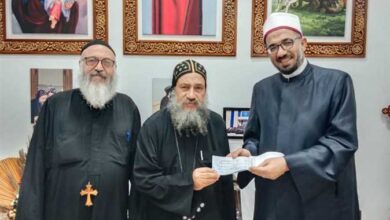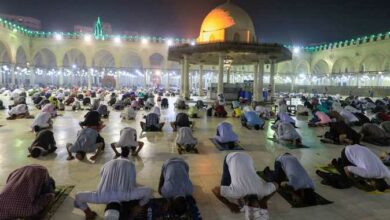
Five times a day throughout Cairo, a group of mosque employees unplug small black boxes. Depending on who you ask, they are either breaking the law or resisting an unfair government imposition.
These muezzin — men who recite the call to prayer — are fighting an effort by the Endowments Ministry to unify Cairo’s call to prayer, forcing every mosque to accept a centralized radio signal and each muezzin to stop reciting a ritual that has been repeated for generations.
The ministry hopes that a unified call will reduce Cairo’s infamous cacophony, but some muezzins worry about losing their jobs. They express sadness at no longer being able to do what their fathers and grandfathers have done ever since the early days of Islam, when a freed Ethiopian slave named Bilal ibn Rabah first inaugurated the practice.
“There are those who will continue to feel a longing for performing the call to prayer, and being spiritually rewarded for it,” said one muezzin at a mosque in Heliopolis. “As the Prophet said, ‘Muezzins will have the longest necks on the Day of Judgment.’”
Rumors come true
One Thursday in August 2010, engineers from a government-contracted company, the Arab Agency for Production, arrived at a number of mosques in Heliopolis. They carried small black boxes with the words “Endowments Ministry” printed on them in white letters.
It was the second day of Ramadan, so no one had eaten since early that morning, and the imams were busy preparing for special, longer prayers in the evening. The muezzins greeted the engineers and watched as they installed the boxes.
The muezzins had been hearing rumors for years that their voices would be replaced by a single call to prayer beamed out by Radio Cairo, but few believed it would really come to pass.
The engineers politely explained that the boxes would turn on and off by themselves and would not need to be touched. The call to prayer would be unified across Cairo, and Heliopolis was just the first stage.
“We found out from the newspapers,” one muezzin recalled. “Nobody told us.”
The plan was meant to address what then-Endowments Minister Hamdy Zaqzouq had called a “war of the microphones.” For the past century, the noise level in Cairo had been growing steadily along with the number of buildings and cars.
Muezzins stopped climbing the minarets to recite the call and instead mounted loudspeakers connected to microphones inside the mosques. Cairo’s dusty air clogged many of the speakers, creating a dense and distorted cacophony at prayer times.
Some found it beautiful. Anthropologist Charles Hirschkind called the multitude of voices a “heavenly interference pattern.” Others found it ugly. A college student named Sama Mustafa told me in 2009 that the call to prayer in Cairo was “annoying” and “screeching” and made her “want to tear [her] skin off.”
The Endowments Ministry, which oversees many of Cairo’s mosques, decided in 2005 that the calls to prayer had become too loud, and that too many amateurs were blasting their own call from small corner mosques without any oversight.
“Unfortunately, we have unpleasant voices in our community of muezzins,” said Salam Abdel Galil, who oversees the project. “Some of them start the call to prayer earlier than others, leading to confusion.”
Galil, a deputy minister, has weathered the reshuffles to the Cabinet brought on by the revolution. He sported a light beard and wore an impeccable blue-gray galabeya with matching pants.
“The muezzins did not want this project to succeed because they want to do the call to prayer themselves,” he said. “But after the first tests, the audiences — both Muslim and non-Muslim — began to encourage it.”
The receiver box in each mosque costs about LE170 to make and install. The entire project, which aims to reach about 3,000 mosques, has reportedly cost between LE600,000 and LE1 million. If the budget allows, the ministry hopes to bring the project to Alexandria and other governorate capitals. Abdel Galil said he thinks it’s only a matter of time.
“Thank God, it faces no problems culturally or politically,” he said resolutely.
Abdel Galil admitted that since the parliamentary elections, some “worshippers who belong to the extremist Salafi movement” have neglected to enforce the unified call. But he said most muezzins are “satisfied with the new situation.”
Unifying voices
Opposition to the plan began almost as soon as the ministry made it public in 2004. A scholar at Al-Azhar University blamed “American hands” for the idea and said the Hosni Mubarak regime was trying to “muzzle religion.”
In 2009, an imam in Zamalek told me he worried the unification of the call to prayer would be the first step toward unifying Friday sermons, forcing every imam to give up his voice as well to the ministry.
Abdel Galil said these fears are unfounded.
“Unfortunately, some of the people are not able to imagine the project and think that we will stop the call to prayer,” he told me. “And naturally, human beings are enemies of the unknown. But when they get to know the project, they will accept it.”
He said muezzins would not necessarily lose their jobs, and would continue to perform the iqama, or the beginning of prayers. They would also be trained to take the imam’s place leading prayers in case of sickness or absence.
“There was some nervousness when the project was first being implemented, but those fears no longer remain,” he said.
Several weeks ago, a muezzin at a mosque near the Citadel greeted me warmly and we sat down on the carpeted floor. When I asked about the unification project, his mood changed.
“It’s going to put me out of work,” he said.
We stood up and he took me to a small office off the side of the main area for prayer. There was a tall stack of technological gadgets with small lights blinking on and off, green and red, and a tangle of wires holding it all together. He pulled a small black box out from the stack.
“Many of the Radio Cairo muezzins have ugly voices,” he said.
“So what do you do?” I asked.
He grinned.
“I just unplug the box.”
“And nobody catches you?”
“Nobody has come back to check on this since they installed it.”
“Is this common?”
“Oh yes. We all do it.”
We left the room and he invited me to sit down on the carpet again. It was 3:30 pm, time for Asr prayer. The speakers, mounted in two corners of the room, clicked on. A disembodied voice began the call to prayer: “God is great, God is great. There is no god but God.”
The muezzin disappeared into the office and a moment later, the voice stopped. He walked over to a microphone and unhooked it from the stand. He tilted his head back, holding the microphone in one hand and cupping his ear with the other.
He recited the call to prayer. It was long and clear, each word pure as it left his mouth and slightly grizzled as it left the cheap speakers, with the echo of other muezzins drifting in like ghosts through the windows.
When he finished, he walked back to the office and plugged the box back in, just in case anyone from the ministry might come by to check. Abdel Galil said nobody checks to make sure everyone is using the boxes unless a member of the community files a complaint. Evidently, nobody has complained near the Citadel mosque I visited.
A few days later, I visited another mosque, located across the street from the first. I asked the muezzin there about the unification project. He said that after the revolution, and with the presidential election and other political issues, no one was working on the project now.
“They installed a box here before the revolution,” he said, “but then after a few months it broke, so I perform the call to prayer now.”
I asked about the other mosque, the one across the street. We locked eyes.
“His box broke just like mine,” the muezzin said.
“It’s broken — really?” I asked, hoping to communicate that I knew it wasn’t true.
He winked.
“Yes,” he said. “Many of them are broken, so we have to perform the call to prayer ourselves.”
This piece was originally published in Egypt Independent's weekly print edition.




